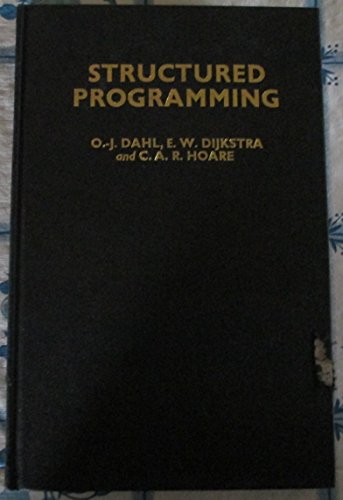Structured Programming
Edsger Wybe Dijkstra; C. A. R. Hoare; Ole-Johan Dahl
BOOK REVIEW

In the realm of computer science, few texts resonate as profoundly as Structured Programming, authored by the legendary trio: Edsger Wybe Dijkstra, C. A. R. Hoare, and Ole-Johan Dahl. This is not merely a book; it's a revolution-a clarion call to the programmers of yesteryears, today, and tomorrow. Released against the backdrop of a burgeoning digital age in the early 1970s, this tome is a testament to the profound shift toward efficiency and clarity in programming practices that the world desperately needed.
Dijkstra, one of the most influential figures in computer science, combines his insight with Hoare's and Dahl's brilliance to provide readers not just with principles, but a philosophy. Think of the programming landscape pre-1972: chaotic, filled with unstructured code that resembled a labyrinthine nightmare. The approach advocated in Structured Programming is nothing short of revolutionary, pulling back the curtain on the chaos and laying down the groundwork for a future where code could be written clearly and read easily, almost like poetry.
As you delve deep into the pages, you're not just reading about constructs and control flow; you're experiencing a mental transformation that elevates your understanding of how to approach problems in programming. Dijkstra's emphasis on logical reasoning and Hoare's ideas on data integrity challenge you to rethink your current coding paradigms. Every page teems with the urgency of necessity and the thrill of discovery, igniting an insatiable curiosity within you.
Critics and enthusiasts alike have praised Structured Programming, each echoing a central sentiment: this work does not merely instruct; it inspires. A user on Goodreads once remarked that it "crystalized my understanding of how I should be thinking about programs." Such fervent testimonials reflect the power inherent in this seminal work. But make no mistake, it's not without its detractors; some argue that its theoretical nature can feel dense and inaccessible to the uninitiated. However, as one reviewer passionately countered, "The depth is what makes it a masterpiece; it's the kind of book that you'll carry with you for a lifetime."
This text shines brightly amid the cacophony of superficial programming guides. It dares to address not just the 'how' but the 'why' of structured programming, a gem that often gets overshadowed in today's fast-paced tech landscape. As the industry churns out frameworks and languages at breakneck speed, the foundational principles in Structured Programming remain critically relevant. They serve as the bedrock upon which future programming methodologies are constructed, from agile development to modern-day organized coding techniques.
Reflect on the lasting legacy of this book. The influence of Dijkstra and his co-authors is palpable, inspiring generations of developers who have shaped the technologies we rely on daily. Each line of code written under the spirit of structured programming reflects a commitment to clarity, efficiency, and timelessness. Who knows how many of today's innovations emerged from minds ignited by the principles once outlined in this very work?
In your quest for knowledge, Structured Programming isn't just a dusty relic of computer science. It's a powerful manifesto inviting you to rethink your approach to coding, to embrace clarity over chaos, and indeed, to see programming as not just a skill but an art form. As you navigate the ever-changing waters of technology, consider that this book could be your compass-steadfast and true, guiding you through the storms of uncertainty that accompany each new line of code. 💡
So, grab your copy, or better yet, share this revelation with fellow developers. Because stepping into the world of structured programming isn't just about learning how to code; it's about transforming the way you think about problems, illuminating pathways that lead not just to solutions but to brilliance.
📖 Structured Programming
✍ by Edsger Wybe Dijkstra; C. A. R. Hoare; Ole-Johan Dahl
🧾 418 pages
1972
#structured #programming #edsger #wybe #dijkstra #EdsgerWybeDijkstra #hoare #CARHoare #johan #dahl #OleJohanDahl